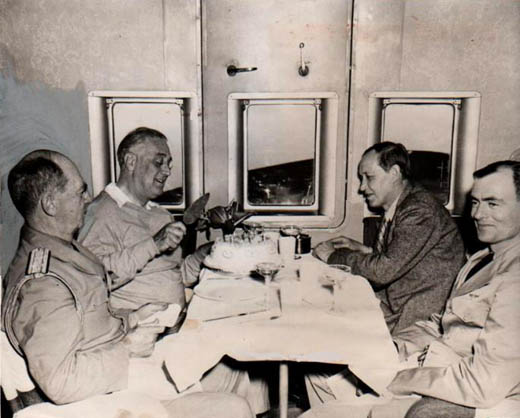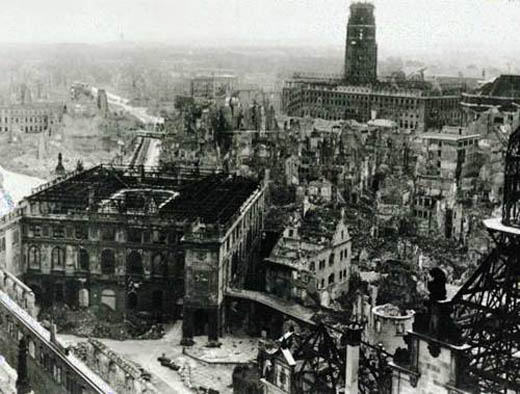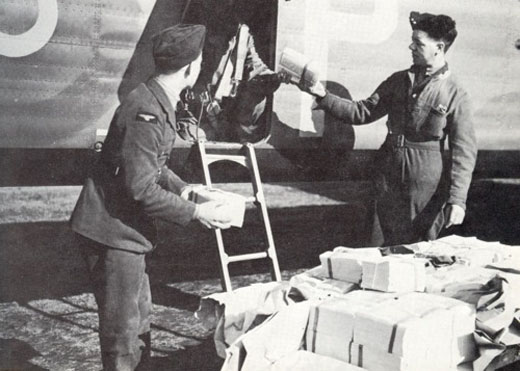Air Operations, Bismarcks
- 43rd Heavy Bomb Group B-17s attack port facilities at Rabaul.
- 90th Heavy Bomb Group B-24s mount single-plane attacks against the Gasmata airfield on New Britain and a ship at sea.
Air Operations, Europe
BOMBER COMMANDDaylight Ops:
- The RAF makes its first daylight raids on Berlin, timed to coincide with broadcasts by Göring and Goebbels. Göring says: 'A thousand years hence every German will speak with awe of Stalingrad and remember that it was there that Germany put the seal on her victory.' 6 RAF Mosquitoes are involved in the 2-wave attack. 1 is lost. Hamburg is also hit by the RAF in a saturation attack.
- 19 Wellingtons of No. 4 Group and 17 Bostons are sent to various places in Germany and Holland, but only 5 Wellingtons and 1 Boston find targets to bomb.
- 4 Wellingtons are lost.
- 148 bombers begin using H2S, in a raid on Hamburg. The total includes 135 Lancasters, 7 Stirlings and 6 Halifaxes.
- Thie is the first H2S raid of the war. H2S is a simple radar set which displays a rough picture of the ground below. It serves primarily as an all-weather bombing aid but is also used for navigational purposes. The early models are notoriously unreliable. Bombing is scattered over a wide area and most of the bombs appear to have fallen in the Elbe River and surrounding marshes. 119 fires are started, however, including 71 classified as large. 58 people are killed and 164 are injured.
- 5 Lancasters are lost.
The term 'H2S' seemingly had no real meaning, and so could not give away its purpose to German spies. (Many German codenames could, with a little lateral thinking, easily give away the purpose of secret equipment). However, when asked what 'H2S' stood for, the scientists responsible for the equipment replied "Home Sweet Home". After the initial trials of H2S had gone badly during 1942, many, who knew their chemistry commented "It stinks!". For those that don't, H2S is the formula for Hydrogen Sulphide.Minor Ops:
- 4 Mosquitos are sent to targets in the Ruhr and 17 aircraft lay mines off St Nazaire and in the Frisians.
- There are no losses.
- Messina, Sicily is heavily bombed by US aircraft.
|
|
Churchill called the January 30th air raid a “devastating attack on the German homeland” and the news was celebrated around the world in the news and at the movies.
[Air Operations, New Guinea
- 3rd Light Bomb Group A-20s attack targets at Lae and Mubo.
- 374th and 317th Troop Carrier group transports begin a three-day emergency airlift of supplies to Australian Army ground forces withstanding a Japanese Army counterattack at Wau. On this first day of the airlift, the 317th Group makes its combat debut.
Air Operations, Solomons
XIII Bomber Command B-17s and B-26s, and XIII Fighter Command P-39s and P-40s attack the Munda Point airfield on New Georgia.
[Air Operations, Tunisia
- 12th Air Force A-20s and fighters conduct numerous attacks on Axis troops, positions, and facilities between Faid and El Guettar.
- Over 50 XII Bomber Command B-17s attack the port facilities and shipping at Ferryville.
- XII Bomber Command B-26s attack the rail line south of Reyville.
- XII Bomber Command B-25s attack rail installations and warehouses at El Aouinet. While escorting, 7 P-38 pilots of the 82nd Fighter Group's 96th Fighter Squadron down 8 Bf-109s about 1040 hours.
Diplomatic Relations
Over the next 2 days the Adana Conference takes place. Churchill and Alanbrooke confer with Turkish leaders and promise direct military assistance if Turkey is forced into the war.
[Eastern Front
The Russians take Tikhoretsk, northwest of Kropotkin and southeast of Rostov, and the Maykop(Maikop?) oilfields are taken by troops from the Trans-Caucasus Front. The German 17th Army in the Kuban Peninsula is now becoming separated from 1st Pzr Army which is managing to retreat toward Rostov. Von Manstein's Don Army Group is forced to retire northward and so can no longer giver any support to Army Group A.
In Stalingrad the Russians find von Paulus' HQ in the southern pocket and begin to surround them. Von Paulus is created Field Marshal by Hitler.
SOUTHERN SECTORHitler promotes Paulus to field marshal, a cynical move to prompt the commander at Stalingrad to commit suicide rather than surrender (no German field marshal has yet surrendered to the enemy).
The 1st Guards Army attacks southwest of Krasny Liman, crossing the Krasnaya to close in around the town. Group Popov moves up between 6th and 1st Guards Armies.
For XIV Panzer, LI and VIII Corps the battle of Stalingrad ends as they are overrun by the 21st and 62nd Shock Armies. Among the prisoners is Gen Seydlitz-Kurzbach. Paulus' army is reduced to IV Corps around his own headquarters and the XI Corps in the factory district.
Tikhoretsk falls to the 9th Army while the Maikop oilfields are cleared by the 12th, 18th and 46th Armies. The 17th Army has now lost contact with the main German line.
In a radio broadcast Hermann Göring proclaims to the nation: 'A thousand years hence Germans will speak of this battle with reverence and awe, and that in spite of everything Germany's ultimate victory was decided there. In years to come it will be said of the heroic battle on the Volga: when you come to Germany, say you have seen us lying at Stalingrad, as our honor and our leaders ordained that we should, for the greater glory of Germany!'
[France, Home Front
The Vichy regime begins the formation of a sort of French version of the Gestapo, called the Milice. It is mainly a political police force that will be used against the members of the Resistance. It will rapidly acquire an odious reputation. Its commander is Joseph Darnand, a supporter of Pétain and a fervent collaborationist.
[Germany, Command
Adm Karl Dönitz is appointed as Commander-in-Chief of the German navy replacing Adm Raeder.
[Germany, Home Front
It is the 10th anniversary of Hitler's regime and special speeches are made in Berlin by Goebbels and Göring to mark the occasion. The RAF also mark the occasion by mounting the first daylight raid on Berlin by a group of Mosquito bombers whose attacks are timed to coincide with the speeches. Göring says, 'if German collapsed . . . the Soviet would sweep through Europe.' Every German must be prepared to give his life 'so that his race may live.'
[Guadalcanal
The 147th Infantry passes through the lines west of the Nueha to attack about 0700. On the beach the 1st Battalion advances against light opposition to the mouth of the Bonegi River, about 2,000 yards west of the Nueha. One patrol crosses the river about 1152. Inland on the left flank, Japanese machine guns stop the 3rd Battalion 1,000 yards east of the Bonegi. When the Japanese on the west bank place heavy fire on the 1st Battalion it withdraws from the west bank and pulls back from the river mouth.
In the morning the task force splits up. The undamaged cruisers head back to Efate and the Chicago (CA-29), now being towed by the tug Navajo (AT-64), for Espriitu Santo at 4 knots. The combat air patrol circles the area directly above the ships but not further out. At 1600 Japanese planes strike Chicago (CA-29) when she is just 40 miles from the carrier Enterprise (CV-6). The Japanese planes are searching for the carrier, but she is too well-protected by her combat air patrol so they go after the stricken cruiser. 9 Betty bombers sneak through the cloud cover. 4 torpedoes hit Chicago's (CA-29( side. One other strikes the destroyer La Vallette (DD-488). The Chicago (CA-29) sinks in 12,000 feet of water, but most of her crew are saved. The destroyer is damaged but is towed to safety. Most of the Japanese bombers are shot down but their technique of torpedo attack is successful and will be used again and again in the months to come. Once again the lack of experience by American sailors show. The bright spot in this action, in going for the naval vessels the Japanese forget about the transports who are able to land and embark again without trouble.
A battalion of the 132nd Inf Regt is to move to the southwest coast of the island to prevent Japanese reinforcements west of Cape Esperance. The Americans move from the Lunga area in 5 LSTs, protected by 4 destroyers and planes from the Cactus Air Force. The Japanese on island note the activity and send word to Adm Kusaka at Rabaul to mount a counterstrike. Half the troops are unloaded and 3 LSTs and 2 destroyers are heading back to the American side of the island when Japanese planes from Rabaul attack. There are no planes to protect these ships. Dive bombers attack and sink the destroyer DeHaven (DD-469). AA fire gets one bomber but the rest return to their base safely.
[New Guinea
The defenders of Wau, reinforced by the Australian 18th Bde, repel the Japanese attacks and put the Japanese to flight.
[North Africa
TUNISIAIn the British 1st Army area, the re-equipped German 21st Panzer Div makes easy gains at Faïd Pass, throwing back inexperienced French and American troops to Sidi Bou Zid. The US II Corps sends Combat Command A, 1st Armored Div, from the Sbeïtla area to help defend Faïd, but the combat command arrives too late. Combat Command C starts northeastward from Gafsa toward the Sidi Bou Zid-Maknassy road. Combat Command D, with the 1st Battalion of the 168th Regimental Combat Team, US 34th Div, attached, moves toward Maknassy. the 168th Regimental Combat Team is concentrating in the Tébessa area.
FDR's 61st Birthday |
 |
Pacific
The Japanese submarine I-10 torpedoes and sinks the US freighter Samuel Gompers (7176t) 115 miles from Amadee Lighthouse, New Caledonia losing 1 Armed Guard sailor and 3 crewmen in the attack. There are 56 survivors.
[
